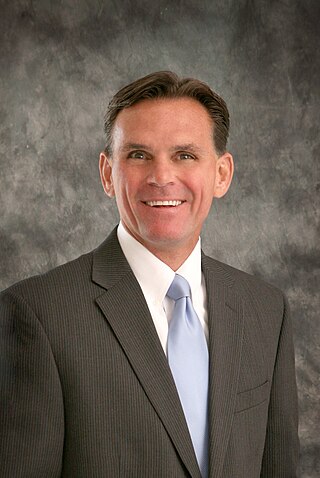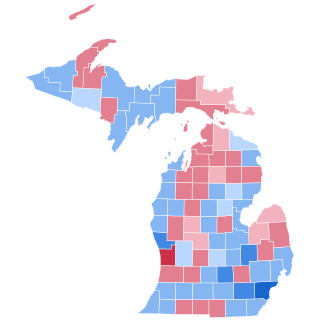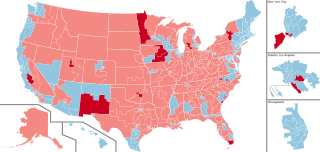| ||||
Two special elections for the Michigan Senate were held in the U.S. state of Michigan on November 2, 2021, in addition to various other local elections and ballot measures.
| ||
| Elections in Michigan |
|---|
 |
Two special elections for the Michigan Senate were held in the U.S. state of Michigan on November 2, 2021, in addition to various other local elections and ballot measures.
Incumbent Republican Peter Lucido resigned on December 31, 2020, to become prosecutor of Macomb County, Michigan after winning election in 2020. [1] Douglas C. Wozniak, a state representative, won the Republican primary, while Martin Robert Genter, a United Nations Foundation volunteer and political consultant, [2] won the Democratic primary. [3]
| Party | Candidate | Votes | % | |
|---|---|---|---|---|
| Republican | Douglas Wozniak | 9,510 | 35.68 | |
| Republican | Pamela Hornberger | 7,861 | 29.49 | |
| Republican | Terence Mekoski | 5,553 | 20.83 | |
| Republican | Mary Berlingieri | 2,050 | 7.69 | |
| Republican | Kristi Dean | 666 | 2.50 | |
| Republican | Bill Carver | 645 | 2.42 | |
| Republican | Grant Golasa | 372 | 1.40 | |
| Total votes | 26,657 | 100.0 | ||
| Party | Candidate | Votes | % | |
|---|---|---|---|---|
| Democratic | Martin Robert Genter | 9,562 | 70.51 | |
| Democratic | John Bill | 3,999 | 29.49 | |
| Total votes | 13,561 | 100.0 | ||
| Party | Candidate | Votes | % | |
|---|---|---|---|---|
| Republican | Douglas Wozniak | 30,555 | 61.9 | |
| Democratic | Martin Robert Genter | 18,838 | 38.1 | |
| Total votes | 49,393 | 100.0 | ||
Incumbent Republican Peter MacGregor resigned on December 31, 2020, to become treasurer of Kent County, Michigan after winning election in 2020. [4] Mark Huizenga, a state representative, won the Republican primary, while Keith Courtade, a former county commissioner, [5] won the Democratic primary. [5]
| Party | Candidate | Votes | % | |
|---|---|---|---|---|
| Republican | Mark Huizenga | 9,531 | 33.82 | |
| Republican | Kevin Green | 9,357 | 33.20 | |
| Republican | Tommy Brann | 9,272 | 32.90 | |
| Write-in | 20 | 0.08 | ||
| Total votes | 28,180 | 100.0 | ||
| Party | Candidate | Votes | % | |
|---|---|---|---|---|
| Democratic | Keith Courtade | 6,413 | 60.94 | |
| Democratic | Gidget Groendyk | 4,101 | 38.97 | |
| Write-in | 10 | 0.09 | ||
| Total votes | 10,524 | 100.0 | ||
| Party | Candidate | Votes | % | |
|---|---|---|---|---|
| Republican | Mark Huizenga | 25,735 | 60.28 | |
| Democratic | Keith Courtade | 15,683 | 36.74 | |
| Libertarian | Alexander Avery | 611 | 1.43 | |
| Constitution | Theodore Gerrard | 420 | 0.98 | |
| Write-in | 38 | 0.09 | ||
| Total votes | 42,487 | 100.0 | ||

The 1980 United States Senate elections were held on November 4, coinciding with Ronald Reagan's victory in the presidential election. The 34 Senate seats of Class 3 were contested in regular elections. Reagan's large margin of victory over incumbent Jimmy Carter gave a huge boost to Republican Senate candidates, allowing them to flip 12 Democratic seats and win control of the chamber for the first time since the end of the 83rd Congress in January 1955. This was the first time since 1966 that any party successfully defended all their own seats.

The 1960 United States Senate elections coincided with the election of John F. Kennedy as president on November 8, 1960. The 33 seats of Class 2 were contested in regular elections. A special election was also held on June 28, 1960, for a mid-term vacancy in North Dakota where Democrats flipped a seat to expand their majority to 66–34. As Majority Leader Lyndon Johnson was elected Vice President, Mike Mansfield became the new majority leader.

Mark Allen Hackel is an American politician serving as the County Executive of Macomb County, Michigan since the position was established in 2011. A member of the Democratic Party, Hackel previously served as the Macomb County Sheriff from 2001 to 2010.

The 2008 United States presidential election in Michigan took place on November 4, 2008. It was part of the 2008 United States presidential election which happened throughout all 50 states and D.C. Voters chose 17 representatives, or electors to the Electoral College, who voted for president and vice president.

The 2014 United States Senate elections were held on November 4, 2014. A total of 36 seats in the 100-member U.S. Senate were contested. 33 Class 2 seats were contested for regular 6-year terms to be served from January 3, 2015, to January 3, 2021, and 3 Class 3 seats were contested in special elections due to Senate vacancies. The elections marked 100 years of direct elections of U.S. senators. Going into the elections, 21 of the contested seats were held by the Democratic Party, while 15 were held by the Republican Party.

The 1994 United States Senate election in Michigan was held November 8, 1994. Incumbent Democratic Senator Don Riegle decided not run for re-election. Spencer Abraham won the open seat, becoming the first and so far only Republican to win a U.S. Senate race in Michigan since Robert P. Griffin in 1972 and the first to win the state's Class I seat since Charles E. Potter in 1952. As of 2024, this is the last time that a man won the Class 1 Senate seat in Michigan, and the last time in general that a Republican was elected to a U.S. Senate seat in Michigan.

The 2014 Michigan gubernatorial election took place on November 4, 2014, to elect the governor of Michigan, concurrently with the election of Michigan's Class II U.S. Senate seat, as well as other elections to the United States Senate in other states and elections to the United States House of Representatives and various state and local elections.

The 2014 Michigan House of Representatives elections were held on November 4, 2014, with partisan primaries to select the parties' nominees in the various districts on August 5, 2014. Members elected at the 2014 election served in the 98th Michigan Legislature which convened on January 7, 2015.

The 2018 United States Senate elections were held on November 6, 2018. Among the 100 seats, the 33 of Class 1 were contested in regular elections while 2 others were contested in special elections due to Senate vacancies in Minnesota and Mississippi. The regular election winners were elected to 6-year terms running from January 3, 2019, to January 3, 2025. Senate Democrats had 26 seats up for election, while Senate Republicans had 9 seats up for election.

The 2017 United States elections were held, in large part, on Tuesday, November 7, 2017. This off-year election featured gubernatorial elections in Virginia and New Jersey, as well as state legislative elections in both houses of the New Jersey Legislature and in the Virginia House of Delegates. Numerous citizen initiatives, mayoral races, and a variety of other local elections also occurred. Special elections were also held for one seat of the U.S. Senate, representing Alabama, and six seats of the U.S. House of Representatives. The Democrats picked up the governorship in New Jersey and the Alabama Senate seat that was up for a special election. The governorship in Virginia and the six House seats that were up for special elections did not change party hands.

The 2020 United States Senate elections were held on November 3, 2020, with the 33 class 2 seats of the Senate contested in regular elections. Of these, 21 were held by Republicans, and 12 by Democrats. The winners were elected to 6-year terms from January 3, 2021, to January 3, 2027. Two special elections for seats held by Republicans were also held in conjunction with the general elections: one in Arizona, to fill the vacancy created by John McCain's death in 2018; and one in Georgia, following Johnny Isakson's resignation in 2019. These elections ran concurrently with the 2020 United States presidential election in which incumbent president Donald Trump lost to Democratic nominee Joe Biden.

The 2016 United States House of Representatives elections in Michigan were held on November 8, 2016, to elect the 14 U.S. representatives from the state of Michigan, one from each of the state's 14 congressional districts. The elections coincided with the 2016 U.S. presidential election, as well as other elections to the House of Representatives, elections to the United States Senate in 33 other states and various state and local elections. The deadline for candidates to file for the August 2 primary election was April 19.

The 2022 United States Senate elections were held on November 8, 2022, concurrently with other midterm elections at the federal, state, and local levels. Regularly scheduled elections were held for 34 of the 100 seats in the U.S. Senate, the winners of which will serve 6-year terms beginning with the 118th United States Congress. 2 special elections were held to complete unexpired terms. While pundits considered the Republican Party a slight favorite to gain control of the Senate, the Democrats outperformed expectations and expanded the majority they had held since 2021, gaining a seat for a functioning 51–49 majority.

The 2020 United States House of Representatives elections were held on November 3, 2020, to elect representatives from all 435 congressional districts across each of the 50 U.S. states to the 117th United States Congress, as well as six non-voting delegates from the District of Columbia and the inhabited U.S. territories. Special House elections were also held on various dates throughout 2020.

United States gubernatorial elections were held on November 8, 2022, in 36 states and three territories. As most governors serve four-year terms, the last regular gubernatorial elections for all but two of the seats took place in the 2018 U.S. gubernatorial elections. The gubernatorial elections took place concurrently with several other federal, state, and local elections, as part of the 2022 midterm elections.
Mark E. Huizenga is a Republican member of the Michigan Senate for the 30th district.

The 2026 United States Senate elections are scheduled to be held on November 3, 2026, with 33 of the 100 seats in the Senate being contested in regular elections, the winners of which will serve six-year terms in the United States Congress from January 3, 2027, to January 3, 2033. Senators are divided into three groups, or classes, whose terms are staggered so that a different class is elected every two years. Class 2 senators were last elected in 2020, and will be up for election in this cycle.

The 2022 Wisconsin fall general election was held in the U.S. state of Wisconsin on November 8, 2022. All of Wisconsin's partisan executive and administrative offices were up for election, as well as one of Wisconsin's U.S. Senate seats, and Wisconsin's eight seats in the U.S. House of Representatives. The fall election also filled the seventeen odd-numbered seats in the Wisconsin Senate and all 99 seats in the Wisconsin State Assembly for the 106th Wisconsin Legislature. The 2022 Wisconsin fall primary was held on August 9, 2022.

The 2018 United States attorney general elections were held on November 6, 2018, in 30 states, 2 territories, and the District of Columbia. The previous attorney general elections for this group of states took place in 2014, except in Vermont where attorneys general serve only two-year terms and elected their current attorney general in 2016.

The 2022 United States attorney general elections were held on November 8, 2022, to elect the attorneys general in thirty states, two territories, and one federal district. The previous elections for this group of states took place in 2018. The attorney general of Vermont serves two-year terms and was last elected in 2020.